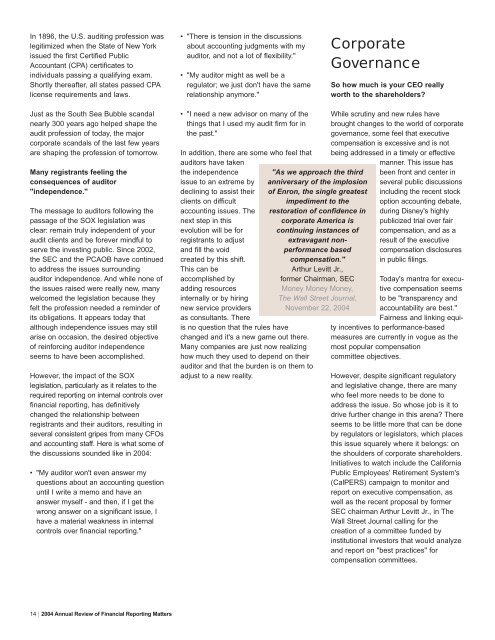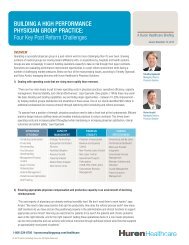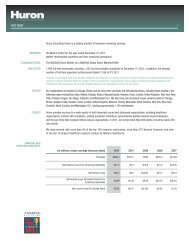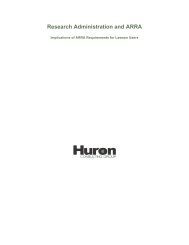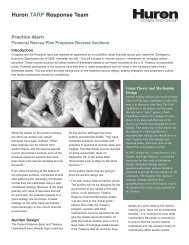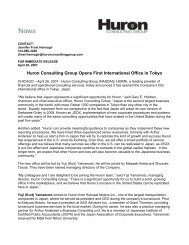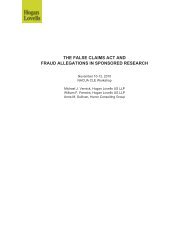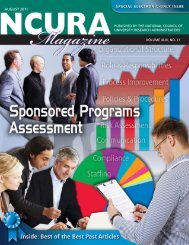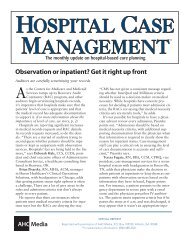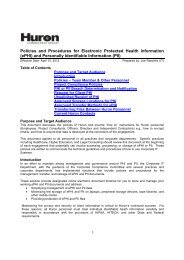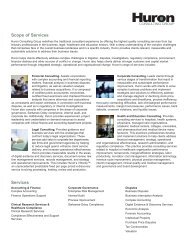2004 Annual Review of Financial Reporting Matters - Huron ...
2004 Annual Review of Financial Reporting Matters - Huron ...
2004 Annual Review of Financial Reporting Matters - Huron ...
Create successful ePaper yourself
Turn your PDF publications into a flip-book with our unique Google optimized e-Paper software.
In 1896, the U.S. auditing pr<strong>of</strong>ession was<br />
legitimized when the State <strong>of</strong> New York<br />
issued the first Certified Public<br />
Accountant (CPA) certificates to<br />
individuals passing a qualifying exam.<br />
Shortly thereafter, all states passed CPA<br />
license requirements and laws.<br />
• "There is tension in the discussions<br />
about accounting judgments with my<br />
auditor, and not a lot <strong>of</strong> flexibility."<br />
• "My auditor might as well be a<br />
regulator; we just don't have the same<br />
relationship anymore."<br />
Corporate<br />
Governance<br />
So how much is your CEO really<br />
worth to the shareholders<br />
Just as the South Sea Bubble scandal<br />
nearly 300 years ago helped shape the<br />
audit pr<strong>of</strong>ession <strong>of</strong> today, the major<br />
corporate scandals <strong>of</strong> the last few years<br />
are shaping the pr<strong>of</strong>ession <strong>of</strong> tomorrow.<br />
Many registrants feeling the<br />
consequences <strong>of</strong> auditor<br />
"independence."<br />
The message to auditors following the<br />
passage <strong>of</strong> the SOX legislation was<br />
clear: remain truly independent <strong>of</strong> your<br />
audit clients and be forever mindful to<br />
serve the investing public. Since 2002,<br />
the SEC and the PCAOB have continued<br />
to address the issues surrounding<br />
auditor independence. And while none <strong>of</strong><br />
the issues raised were really new, many<br />
welcomed the legislation because they<br />
felt the pr<strong>of</strong>ession needed a reminder <strong>of</strong><br />
its obligations. It appears today that<br />
although independence issues may still<br />
arise on occasion, the desired objective<br />
<strong>of</strong> reinforcing auditor independence<br />
seems to have been accomplished.<br />
However, the impact <strong>of</strong> the SOX<br />
legislation, particularly as it relates to the<br />
required reporting on internal controls over<br />
financial reporting, has definitively<br />
changed the relationship between<br />
registrants and their auditors, resulting in<br />
several consistent gripes from many CFOs<br />
and accounting staff. Here is what some <strong>of</strong><br />
the discussions sounded like in <strong>2004</strong>:<br />
• "My auditor won't even answer my<br />
questions about an accounting question<br />
until I write a memo and have an<br />
answer myself - and then, if I get the<br />
wrong answer on a significant issue, I<br />
have a material weakness in internal<br />
controls over financial reporting."<br />
• "I need a new advisor on many <strong>of</strong> the<br />
things that I used my audit firm for in<br />
the past."<br />
In addition, there are some who feel that<br />
auditors have taken<br />
the independence<br />
issue to an extreme by<br />
declining to assist their<br />
clients on difficult<br />
accounting issues. The<br />
next step in this<br />
evolution will be for<br />
registrants to adjust<br />
and fill the void<br />
created by this shift.<br />
This can be<br />
accomplished by<br />
adding resources<br />
internally or by hiring<br />
new service providers<br />
as consultants. There<br />
is no question that the rules have<br />
changed and it's a new game out there.<br />
Many companies are just now realizing<br />
how much they used to depend on their<br />
auditor and that the burden is on them to<br />
adjust to a new reality.<br />
"As we approach the third<br />
anniversary <strong>of</strong> the implosion<br />
<strong>of</strong> Enron, the single greatest<br />
impediment to the<br />
restoration <strong>of</strong> confidence in<br />
corporate America is<br />
continuing instances <strong>of</strong><br />
extravagant nonperformance<br />
based<br />
compensation."<br />
Arthur Levitt Jr.,<br />
former Chairman, SEC<br />
Money Money Money,<br />
The Wall Street Journal,<br />
November 22, <strong>2004</strong><br />
While scrutiny and new rules have<br />
brought changes to the world <strong>of</strong> corporate<br />
governance, some feel that executive<br />
compensation is excessive and is not<br />
being addressed in a timely or effective<br />
manner. This issue has<br />
been front and center in<br />
several public discussions<br />
including the recent stock<br />
option accounting debate,<br />
during Disney's highly<br />
publicized trial over fair<br />
compensation, and as a<br />
result <strong>of</strong> the executive<br />
compensation disclosures<br />
in public filings.<br />
Today's mantra for executive<br />
compensation seems<br />
to be "transparency and<br />
accountability are best."<br />
Fairness and linking equity<br />
incentives to performance-based<br />
measures are currently in vogue as the<br />
most popular compensation<br />
committee objectives.<br />
However, despite significant regulatory<br />
and legislative change, there are many<br />
who feel more needs to be done to<br />
address the issue. So whose job is it to<br />
drive further change in this arena There<br />
seems to be little more that can be done<br />
by regulators or legislators, which places<br />
this issue squarely where it belongs: on<br />
the shoulders <strong>of</strong> corporate shareholders.<br />
Initiatives to watch include the California<br />
Public Employees' Retirement System's<br />
(CalPERS) campaign to monitor and<br />
report on executive compensation, as<br />
well as the recent proposal by former<br />
SEC chairman Arthur Levitt Jr., in The<br />
Wall Street Journal calling for the<br />
creation <strong>of</strong> a committee funded by<br />
institutional investors that would analyze<br />
and report on "best practices" for<br />
compensation committees.<br />
14 | <strong>2004</strong> <strong>Annual</strong> <strong>Review</strong> <strong>of</strong> <strong>Financial</strong> <strong>Reporting</strong> <strong>Matters</strong>


